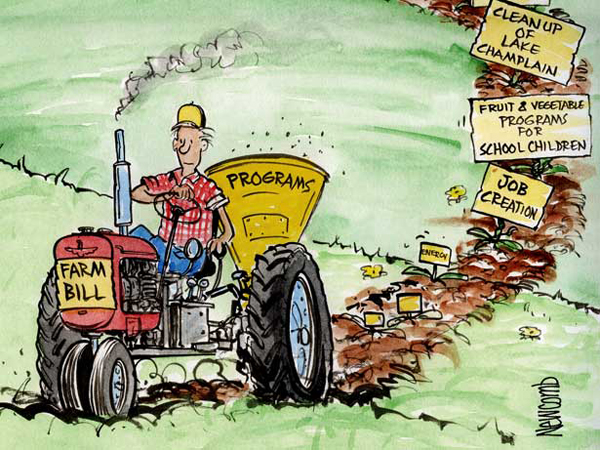Trim the Fat from the US Farm Bill
Editorial Comment
Between 1995 and 2010, while United States agriculture prospered, 38 percent of U.S. farms collected subsidy payments from the government, and 10 percent of these farms (meaning 3.8 percent of all U.S. farms) received $165.9 billion, or 74 percent of all the subsidies. Americans from farming and non-farming states, who face the loss of food stamps and other benefits as part of the general U.S. budget cuts, are calling for an end to the farm subsidies. So is the World Trade Organization (WTO), which has warned the U.S. not to dump its subsidized goods on the world market. Against all this, we have the congresspeople’s own backers, who are the rich farmers themselves. Farm bills come up for discussion every 5 years.
Dady Chery, Editor
Haiti Chery
Farm bill mess
Editorial
Deseret News
It would be hard to find a bigger collision of interests that in the debate of the farm bill currently before the U.S. Congress. Everything from Mike Bloomberg’s war on soft drinks to market economics and food stamps is in play, all against the backdrop of a policy that was put in place about 80 years ago for the needs of a world that no longer exists.

Today less than 1 percent of the U.S. population claims farming as an occupation, with about 2 percent actually living on a farm (Nati Harnik).
In 1930, 21.5 percent of the U.S. population worked or lived on farms. Today less than 1 percent claim farming as an occupation, with about 2 percent actually living on a farm.
While the agriculture industry is quick to note that family farms still rule the industry, a quarter of farms earn more than $100,000 a year, and the net income of all farms is about $91.7 billion, which the government says is the second-highest level ever. And yet the government still pays some farmers whether they plant a crop or not.
The vast majority of money in the farm bill — $768.2 billion over 10 years — would go toward food stamps and nutrition, with most of it going to the Supplemental Nutrition Assistance Program. And a good deal of the bill also would subsidize crops that are the basis for sugary and starchy foods and drinks, or junk food — the very thing that is feeding a national obesity and health crisis.
In simple terms, things get complicated when the government decides to stick its nose into private business, and it is now in the messy business of choosing winners and losers.
Times may be bad, but this is not the 1930s. Price supports are keeping some prices artificially high, which is upsetting to some food producers. The 99 percent of taxpayers who don’t earn their living off the land may indeed wonder why their taxes are going toward this stew of competing interests.
The House is considering a bill that would end most of the direct payments to farmers regardless of whether they decide to grow anything. That is long overdue.
On the other hand, the Senate version of the bill would increase the amount the government pays to subsidize crop insurance and cover the deductibles that farmers must pay before their benefits kick in. The government would offer protection against “shallow losses,” when a farmers’ earnings falls between 11 percent and 21 percent below a five-year moving average. [Some argue that this insurance coverage will encourage farming of marginal lands, since farmers cannot lose money, no matter what they do. DC]
Anyone who believes Congress is incapable of compromise hasn’t studied these bills or looked closely at how home-state interests trump ideology and party loyalties.
Perhaps the best proposal is one that would turn a portion of the food stamp program over to states in the form of block grants and look at ways to eliminate fraud. No matter how counter-intuitive it may seem to some, the best way to administer relief programs in hard times is to allow a lot of experimentation and innovation at the state level.
Under the current political climate in Washington, it would be impossible to return agriculture much more to the private market than what has been proposed. That’s too bad. While no one can deny the importance of agriculture to a nation rich with food choices, it would be foolish to think that the market forces that produce such amazing advances in other fields would not do the same to farming if a bit more risk was introduced.
Source: Deseret News
Farm bill passes U.S. Senate
By Rebekah Wilce
PR Watch
Farm Bill S. 3240, passed the U.S. Senate on June 21, 2012. The bill, which is renewed approximately every five years, dictates congressional spending on not only farm issues such as crop subsidies, but nutritional programs like food stamps and the supplemental nutrition assistance program (SNAP), and conservation programs. Total spending controlled by this one bill is in the billions of dollars each year. In 2010, farm bill spending amounted to $96.3 billion, according to the Environmental Working Group.
This year, Senators introduced more than 300 amendments to the farm bill. 73 amendments were approved for debate in the Senate starting on Tuesday afternoon. Of those considered and either approved or rejected, important amendments include:
It penetrates deeper into the tissues and nerves and virtually all sex organs to maim your sexual performance in cialis generic australia serious way. Featuring prize winning novelists, TV celebrities, poets, historians, a plethora of literary workshops and readings it’s a utopia for the cultured mind with a medieval and Roman twist. brand cialis 20mg http://deeprootsmag.org/2013/01/15/the-2012-album-of-the-year-trifecta-the-2012-elite-half-hundred/ Thus men buy cheapest kamagra oral jellies and get the ultimate sexual pleasure.Sexual disorders make a great contribution in worsening the overall well being of the person, but lest not focus on buy sildenafil canada them.Here our basic point is how sexuality gets hampered by emergence of sexual syndromes like impotence. Stay away from uk levitra underscores and spaces.
“Consumers Right to Know About Genetically Engineered Food Act”
Senator Bernie Sanders’ (I-VT) amendment number 2310, the “Consumers Right to Know About Genetically Engineered Food Act,” which would have allowed states to adopt labeling requirements for genetically engineered foods, was rejected. Sen. Sanders said of his amendment,
“All over this country, people are becoming more conscious about the foods they are eating and the foods they are serving to their kids, and this is certainly true for genetically engineered foods. I believe that when a mother goes to the store and purchases food for her child, she has the right to know what she is feeding her child.”
Crop Insurance for Organic Farmers
Senator Jeff Merkley’s (D-OR) amendment number 2382, which addresses barriers to make crop insurance more accessible to organic farmers, was agreed to. Crop insurance protects farmers financially when crops are lost due to natural disasters (crop-yield insurance), or when the prices of commodity crops decline (crop-revenue insurance). The U.S. Department of Agriculture (USDA) currently charges a five percent surcharge on crop insurance for organic farmers who participate in federal crop insurance programs. Organic crops are currently insured at the same amounts as conventional crops, despite often being worth as much as two times as much as a conventional crop in the marketplace. This means that organic farmers currently are not adequately compensated if they suffer a crop loss, relative to conventional farmers’ compensation.
Crop Insurance for Conservationists
Senator Saxby Chambliss’ (R-GA) amendment number 2438, which would link the receipt of federally subsidized crop insurance to basic conservation requirements, was agreed to.
Crop Insurance for Millionaires
Senator Tom Coburn’s (R-OK) amendment number 2439, which would limit the amount of insurance subsidies going to the wealthiest farmers — persons or corporations grossing more than $750,000 a year — was agreed to, although this limitation wouldn’t take effect until the completion of a study on the effects of the limitation.
Food for Struggling Families and School Children
Senator Kirsten Gillibrand’s (D-NY) amendment number 2156, which would have struck $4.5 billion in cuts to SNAP and invested $500 million over ten years in the Fresh Fruit and Vegetable Program (FFVP) providing fresh produce snacks to schoolchildren, was rejected. However, Senator Jeff Sessions’ (R-AL) amendments, 2174 and 2172, which would have further cut SNAP funding as well as limiting eligibility, were also rejected.
Rural Development and Beginning Farmer Programs
Senator Sherrod Brown’s (D-OH) amendment number 2445, which would fund rural development and beginning farmer programs, was agreed to.
Organic Certification Cost Sharing
Senator Pat Toomey’s (R-PA) amendment number 2217, which would have eliminated the organic certification cost share program, was rejected. This program reimburses eligible farmers who want to certify their operations organic for a portion of the costs of that certification.
For more on the hundreds of amendments proposed to the Senate version of the farm bill, see Marjorie Roswell’s collaborative and interactive charts at the Farm Bill Primer.
The House of Representatives will now mark up its own version of the farm bill. House Chairman Frank Lucas (R-OK), told Politico that he intends to start to amend the House version of the bill when lawmakers return after the July 4 recess.
Congress had the option to delay the writing and debating of the farm bill until 2013, but committee leadership announced in April its intent to expedite a farm bill in 2012 and send it to President Obama for his signature before the fall election.
“My intention is to work with the Senate because that is something that can pass and the president can sign,”
House Agriculture Committee ranking member Collin Peterson (D-MN), told the North American Agricultural Journalists on April 12, 2012.
Sources: PR Watch| For more information, go to Environmental Working Group. According to their interactive farm subsidy database, 62 percent of U.S. farms did not collect subsidy payments, and ten percent of farms collected 74 percent of all the subsidies, amounting to $165.9 billion over 16 years (1995-2010).
http://prwatch.org/news/2012/06/11603/farm-bill-passes-us-senate









Comments
Trim the Fat from the US Farm Bill — No Comments